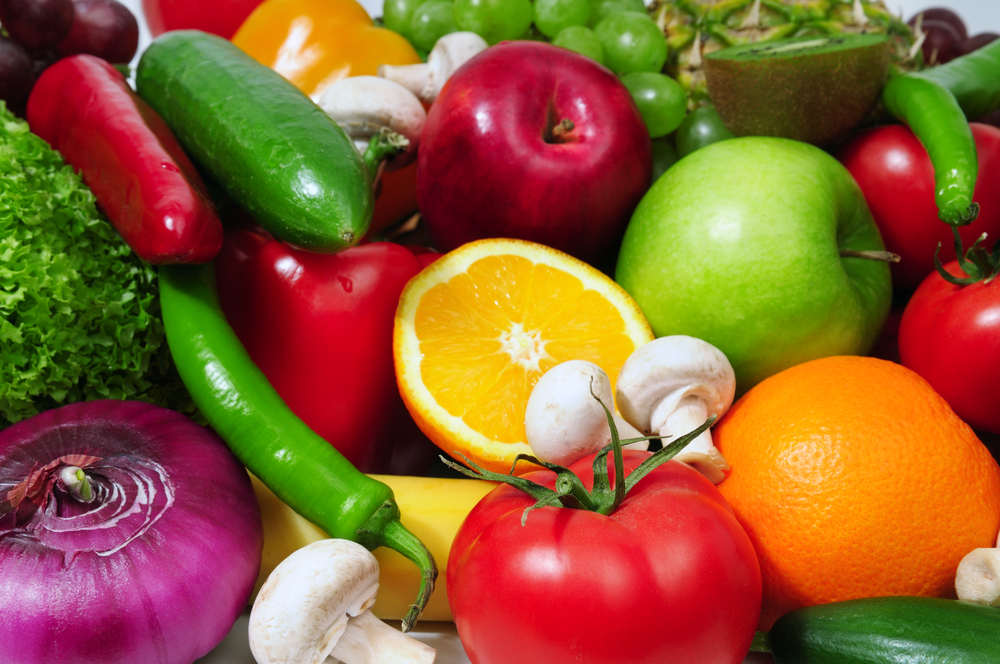Make It 7: More Fruit and Veggie Servings Needed?

Eating seven or more servings of fruits and vegetables a day reduces people's risk of dying, a new study suggests.
The study also found that fresh vegetables may be slightly more protective than fresh fruit, and canned fruit may actually increase the risk of death.
Researchers analyzed information from more than 65,000 people in England ages 35 and older who answered questions about their eating habits.
People who ate seven or more servings of fruits and vegetables were 42 percent less likely to die from any cause over a nearly eight-year period, compared with those who ate less than one serving a day. [6 Easy Ways to Eat More Fruits and Vegetables]
Eating fewer than seven servings was also beneficial, although the protective effect was not as strong: People who ate one to three servings were 14 percent less likely to die during the study; those who ate three to five servings were 29 percent less likely to die, and those who ate five to seven servings were 36 percent less likely to die, compared to people who ate less than one serving.
The findings held even after the researchers took into account factors that may affect people's risk of dying, such as cigarette smoking, body mass index and physical activity level.
Although eating seven or more servings a day was linked with the most benefits, "People shouldn't feel daunted by a big target like seven," study researcher Oyinlola Oyebode, of the University of California, Los Angeles, said in a statement. "Whatever your starting point, it is always worth eating more fruit and vegetables."
Get the world’s most fascinating discoveries delivered straight to your inbox.
Vegetables trump fruit?
Each daily serving of fresh vegetables was linked with a 16-percent reduction in a person's risk of dying, while each serving of fresh fruit was linked with a 4-percent reduction in risk of death.
"Vegetables have a larger effect than fruit, but fruit still makes a real difference," Oyebode said.
However, each serving of canned or frozen fruit increased the risk of death by 17 percent. Because the researchers did not distinguish between frozen and canned fruit, they cannot say whether one or both types of fruit were responsible for the effect. However, they noted that canned fruit is much more popular than frozen fruit in Europe.
The high levels of sugar found in canned fruit may outweigh the benefits of the fruit, Oyebode said.
Still, the researchers noted the study found associations, and cannot prove that fruits and vegetables were solely responsible for the reduced risk of death, or that canned fruit increases the risk of death. The study did not take into account people's total calorie intake or salt consumption, which may affect the link.
It's also possible that people with poor access to fresh fruit and vegetables experience other factors that increase their risk of dying, such as health conditions or stressful lives, the researchers said.
Policy implications
The findings agree with dietary recommendations in the United States, which say that people who eat 2,000 calories daily should consume nearly nine servings of fruits and vegetables (2 cups of fruit and 2.5 cups of vegetables, with a half-cup being one serving), according to Harvard School of Public Health.
However, people's actual consumption of fruits and vegetables often falls short of guidelines. In the study, people in England said they ate just under four servings of fruits and vegetables a day, and a 2013 report from the U.S. Centers for Disease Control and Prevention said that Americans eat less than three portions a day.
"With increasing evidence of their health benefits, policy-makers may need to consider broader initiatives to promote fruit and vegetable consumption, particularly vegetables and salad," the researchers wrote today (March 31) in the Journal of Epidemiology and Community Health.
In order to help individuals in poor areas, policies should seek not only to educate people, but also to increase access to fruits and vegetables, the researchers said.
Follow Rachael Rettner @RachaelRettner. FollowLive Science @livescience, Facebook & Google+. Original article on Live Science.

Rachael is a Live Science contributor, and was a former channel editor and senior writer for Live Science between 2010 and 2022. She has a master's degree in journalism from New York University's Science, Health and Environmental Reporting Program. She also holds a B.S. in molecular biology and an M.S. in biology from the University of California, San Diego. Her work has appeared in Scienceline, The Washington Post and Scientific American.


